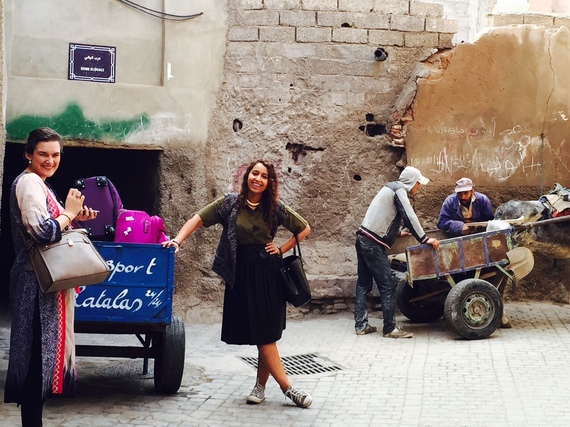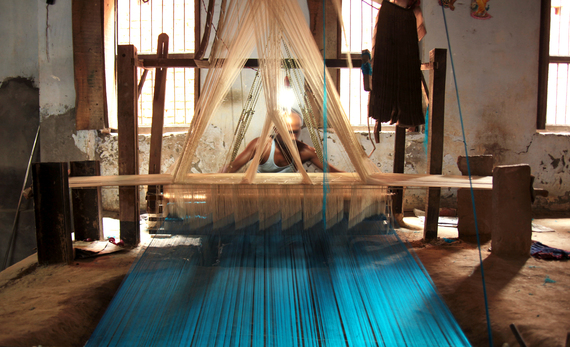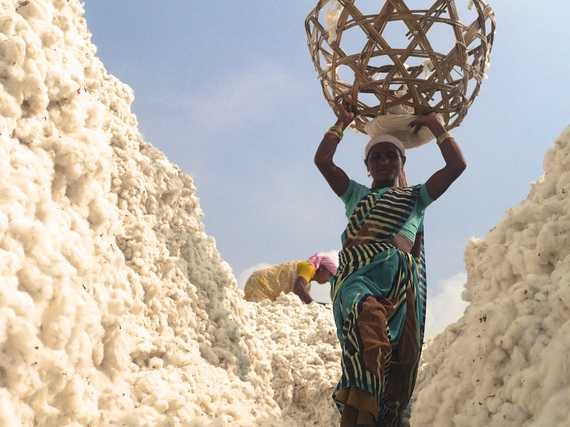An interview with Natalie Grillon of Project JUST on the Eve of Fashion Revolution Week 2016
According to Fashion Revolution's organizers, "transparency is the first step to transform the [fashion] industry." The movement holds an international awareness campaign each year around the anniversary of the tragic collapse of the Rana Plaza garment factory in Bangladesh on April 24, 2013, during which they urge consumers to ask brands via social media and otherwise, "#whomademyclothes?".
Transparency is one of the cornerstones of ethical fashion -- it's the only way we can know how people and the environment were treated in the production of our clothes. But without public reporting requirements, where do people turn to get this information in a digestible format without Snapchatting a brand every time they want to make a purchase?
Project JUST seeks to fill this gap. Publicly launched in December 2015, the online platform is set up as a "Wikipedia" of fashion brands, offering consumers deep insights into the business practices of the brands in its database, now up to 70. Shared information on the community-based platform is gathered from participating companies, from its team's own research and from active users who have submitted everything from articles and insights to requests for JUST to find out more about particular brands. Natalie Grillon, who co-founded Project JUST together with Shahd AlShahail, notes that JUST and Fashion Revolution are complimentary: whereas Fashion Revolution is an awareness and education campaign, JUST is a community that seeks to provide tools for behavior change.

Natalie and Shahd of Project JUST
When I sat down with Natalie last week, I was most interested to find out how she sees Project JUST impacting consumer behavior. There is so much information provided on the site! How do we process it? She explained, "We originally thought about having a score or grade and a binary buy this brand list / don't buy this brand list - but we found through testing this wasn't what our users were seeking. It didn't give them clarity and...so many brands fall in this gray area."
Instead, says Natalie, she sees Project JUST as a means "to help users understand the things they need to think about" in terms of brands' practices, so that they can decide for themselves from the facts, "OK, I feel good about this practice," or "this brand's lack of transparency doesn't feel right to me." Like Wikipedia, JUST wants to get its users invested in the information. For example, a number of shoppers have requested that JUST add Primark, an Irish "fast fashion" brand, to the database, so JUST will be taking its followers along on the research process, asking them to contribute through social media. Buttons at the bottom of each brand page ask users, "How do you feel?"
At the same time, the organization wants to make the information the brand directory provides "convenient and accessible," and they've found consumers would like some high-level guidance as they wade through the data. So, using the directory as the foundation, Project JUST will soon roll out JUST Approved: "A curated list of innovative brands who move the industry in a positive direction."
Information versus Certification.
Natalie takes pains to distinguish JUST Approved from a certification. "I'm personally not a huge proponent of certification. The certifications are typically based on very "western" guided principles and concepts, and they don't leave a lot of leniency for context... In certain situations I've even seen them corrupted, particularly when you're being audited...[by an organization you're paying for certification]."
What concerns Natalie the most about certifications is that they can confuse consumers who don't understand the nuances involved. For example, some certification bodies require manufacturers in the supply chain to recycle. "There just isn't the infrastructure to do that [where some brands are operating]." Still, Natalie concedes that the "Fair Trade and Organic [certifications] started shifting the industry to where it is today - they started conversations about living wages, organic cotton" and other concepts that hadn't been on the radar before. They also allow brands to show industry participants that they are serious about their commitment to ethical concepts.
Natalie says to "think of JUST Approved as more like a 'Good Housekeeping seal of approval' - we've researched, weighed the considerations, and we have a conversation around all the factors to account for the nuances in each situation, rather than ticking required boxes."
Will transparency ever become the norm?
With the rapid growth of fast fashion of late, it's hard at times to see ethical fashion gaining a real foothold. But Natalie remains optimistic.
Take the millennial generation, for example: a generation "sick of the establishment." Natalie has seen from millennials a "desire to pick brands that are trying new retail models and new marketing techniques, that speak to the user in a way they are accustomed to being spoken to," referring to the transparent, open lines of communication that social media platforms are meant to foster.
There are also more designers today who care about ethics in their industry, "not just at the raw materials & resources level, but also at the human capital level," which touches everyone from the seamstress to the staff designer. As these designers infuse these values into their own brands, we'll hopefully see changes spread throughout the industry.
Let's not forget that fast fashion certainly isn't going anywhere soon. Zara's parent company, Inditex, is larger than any apparel producer or retailer. But even these behemoths have picked up on changing consumer preferences: H&M, Inditex and Primark all have sustainability initiatives reported on their websites. "This kind of investment and commitment from the biggest companies means [the movement towards transparency is] not just a trend." How do we know whether these giants' efforts are really translating into an ethical supply chain at such a large scale? Better check the JUST report.
The author has no material connection with or financial stake in any of the brands, companies or individuals mentioned in this post.
All images courtesy of Project JUST.


